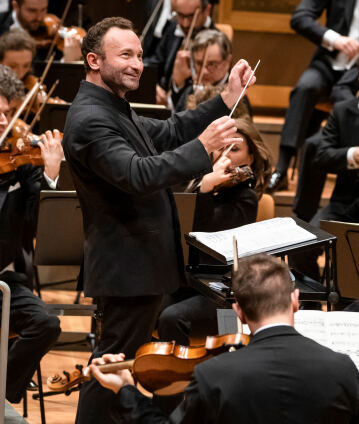Kirill Petrenko and András Schiff with works by Brahms and Suk

One of Kirill Petrenko’s priorities is to introduce the music of Josef Suk to a larger audience. At this concert, he presents the symphonic poem The Ripening, which combines late Romantic tonal splendour with modern harmony. Johannes Brahms was a supporter of Suk. We hear Brahms’s Second Piano Concerto, in which brusque force and tender feelings collide. The soloist is Sir András Schiff, a long-time partner of the Berliner Philharmoniker.
In the 1890s, as a young aspiring composer, Josef Suk was introduced to Johannes Brahms by his teacher and later father-in-law Antonín Dvořák. At that time, Brahms had already completed his series of major orchestral works.
His Second Piano Concerto, premiered in 1881, is the only one of Brahms’s solo concertos to have four movements instead of the usual three, making a directly symphonic statement. The additional Scherzo is not at all jocular but, for all its elegance, particularly passionate. The opening movement, which begins with a horn solo, is a prime example of perfect thematic treatment, and the andante, whose poignant theme is first introduced by a solo cello, is one of the highlights of the genre’s history. The gravity of the composition is only relieved in the brilliant final rondo. The soloist in this performance is András Schiff, who has been closely associated with the Berliner Philharmoniker for many years.
Following performances of the Asrael Symphony and the tone poem A Summer’s Tale, Kirill Petrenko now presents Josef Suk’s third major orchestral work, The Ripening. It was a recording of this symphonic poem, first performed in 1918, that gave the conductor an “overwhelming listening experience” and made him aware of the significance of the Czech composer. On the dramaturgy of the piece, performed here for the first time by the Berliner Philharmoniker, Suk explained: “After a great, passionate build-up of tension and excitement, a deep calm sets in towards the end, in which, however, a hymn of affirmation of life shimmers.”
© 2022 Berlin Phil Media GmbH
Related interviews
Artists
Our recommendations
- Bartók and Brahms with Herbert Blomstedt and András Schiff
- Kirill Petrenko conducts Shostakovich’s Eighth Symphony
- Kirill Petrenko conducts Strauss’s “Elektra”
- Kirill Petrenko conducts Scriabin, Stravinsky and Stephan
- Season opening 2024: Kirill Petrenko conducts Bruckner’s Fifth
- Kirill Petrenko conducts Beethoven’s Ninth Symphony at the Brandenburg Gate